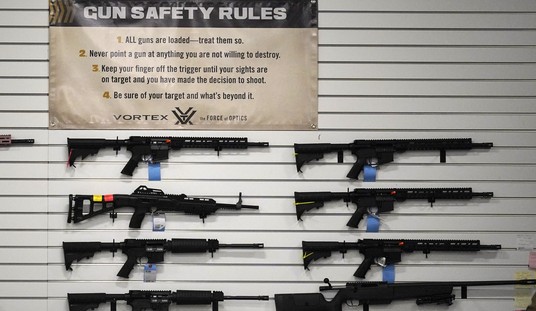Before a couple of years ago, I only vaguely knew what merchant category codes were. I'd read about them a time or two but it wasn't something that impacted my life in any way, so I didn't pay much attention to them.
Then some jackwagon got the idea that these could be used to track gun sales, ostensibly so financial tools used to discover things like financial crimes could be applied to preventing mass shootings. Of course, the fact that the moron who proposed it didn't know the difference between "stockpiling" and normal gun-buying behavior just made the idea dumber.
The problem was, a lot of people thought it sounded like a swell idea.
There have been efforts to do just that to varying degrees. Some states now require them while other states forbid them, creating a patchwork of rules for the codes.
Now, a bill has been introduced to simplify everything for everyone.
Rep. Riley Moore (R-WV) introduced the Protecting Privacy in Purchases Act on Tuesday to prohibit credit card companies from implementing a backdoor gun registry to track purchases.
Moore’s bill, introduced with 25 of his House colleagues, bans the use of a new, unique Merchant Category Code (MCC) for transactions involving firearms and ammunition. While financial institutions use these codes to organize data on other consumer purchases, Second Amendment restrictionists, including in the California legislature, could weaponize a unique code for guns and ammo to compile data on gun owners.
Moore’s bill would preempt state and local laws to protect privacy and Second Amendment rights.
“I’ve spent the better part of my short career in public service fighting financial institutions that push a political agenda,” Moore said. “Let me be clear: any attempt to collect data on Americans simply exercising their God-given rights is wrong, and I won’t stand for it.”
See? It simplifies it by just prohibiting the practice entirely.
The Citizens Committee for the Right to Keep and Bear Arms issued a press release on Tuesday supporting the measure:
“Our hats are off to Rep. Moore and his colleagues,” said CCRKBA Chairman Alan Gottlieb. “Gun control advocates have tried all manner of privacy invasions over the years, and tracking personal purchases of legal, constitutionally-protected products is among the worst examples of such insidious efforts.”
...
“The effort to establish a special four-digit MCC dates back to the Joe Biden era when the International Standards Organization approved creation of such a code,” Gottlieb recalled. “It is unconscionable for financial institutions to create a system for collecting this sort of data on law-abiding citizens, so government can monitor their activities. This is the United States, not a police state, and there is no place in a free society for the collection of such information.
“It is none of anyone’s business what honest citizens buy and own,” he observed, “and it is certainly none of the government’s business to micro-manage their lives. Passage of the PPPA will prevent such nonsense from becoming part of our government framework.”
And let's understand that it's not some kind of pro-gun paranoia that leads people to believe this information will be used to track law-abiding Americans' gun purchases. That's literally the reason given for it in the first place. The claim might be that it's necessary to prevent mass shootings, but as I pointed out earlier, most mass killers don't buy a dozen firearms at a go. They buy one or two, which isn't that different from what many other people do, then maybe go back later.
The difference in behavior isn't that easy to see.
What happens, though, is people look at the behavior of the mass killers and think they see a pattern where nothing exists because they've never bothered to look outside of that particular bucket of data. They think they see an abnormality where none is present.
So merchant category codes wouldn't do what people claim, and that's without taking into account that gun stores rarely just sell guns and ammo. Almost all of them sell other goods to some degree. Many are pawn shops. Others are outdoor sports stores. Imagine getting investigated because you bought a bass boat from a store that also sells guns.
Then there's the fact that no, the government has no authority to justify tracking the purchases of law-abiding Americans. Especially when they're exercising a constitutionally protected right.
This bill would put an end to that and override state requirements for such codes. That's good for everyone and this needs to pass. I'm not entirely sure that this would be the hill Senate Democrats would choose to die on by opposing it, either. They won't vote for it, but I'm not sure they'd bother with filibustering it.
So that's good news.
Here's hoping it passes.








Join the conversation as a VIP Member